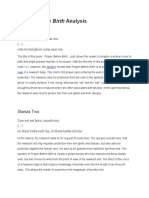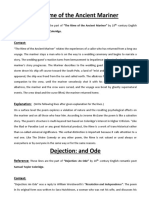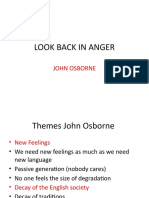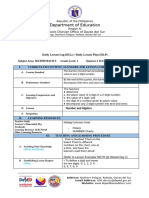Summary of The Valediction of Weeping
Summary of The Valediction of Weeping
Uploaded by
JamilKhanDurraniCopyright:
Available Formats
Summary of The Valediction of Weeping
Summary of The Valediction of Weeping
Uploaded by
JamilKhanDurraniOriginal Description:
Original Title
Copyright
Available Formats
Share this document
Did you find this document useful?
Is this content inappropriate?
Copyright:
Available Formats
Summary of The Valediction of Weeping
Summary of The Valediction of Weeping
Uploaded by
JamilKhanDurraniCopyright:
Available Formats
1
Summary and Analysis of A Valediction of Weeping by John Donne
He was the son of a wealthy iron merchant, born in London in 1572. He came from a very
influential family background. On his father’s side he came from an old Welsh family and on his
mother’s side from the Heywoods and Sir Thomas More’s family. He was educated at his home
till he was eleven, and later sent to Oxford, and at fourteen to Cambridge. But he could not
continue his education due to his family’s inclination towards Romantic Catholicism. While he
was studying law at Lincoln’s Inn, he gave up his Catholicism and called himself simply
Christian. He travelled to Rome and Italy and upon his return to England was appointed secretary
to the Earl of Ellesmere. His career was terminated when he fell in love and married the Earl’s
young niece, Anne More. After years of poverty and hardships, the young lovers were forgiven
by Sir George More. He also presented his daughter with an allowance of £800. With his
“Pseudo Martyr” he gained the favour of James I and in 1619, he was sent on a diplomatic
mission to Germany with Lord Doncaster. Later he was appointed as Dean of St. Paul’s
Cathedral in London and reached his peak of popularity. He died in 1631 at Essex and is buried
in St. Paul’s Cathedral.
Donne’s poetry is categorised as Metaphysical Poetry. A school of poetry according to Dryden
which “affects the metaphysics, not only in his satires, but in his amorous verses, where nature
only should reign; and perplexes the mind the minds of the fair sex with nice speculations of
philosophy, when he should engage their hearts, and entertain them with the softness of love.”
His poetry is witty and engages the reader’s intellectually. His knowledge and learning are
reflected in his poems through his abundant use on ‘conceits’.
The poem “A Valediction of Weeping” was most probably written by Donne after he met Anne
More. There are subtle hints which could make us assume that the poem is autobiographical. But
one could not be so sure when it comes to Donne’s poetry. Certainly, he has used
autobiographical elements, but they are very cunningly and wittily enclosed within the veils of
wit and imagination.
Theme:
The theme of the poem is the departure of the poet for a voyage. The poem expresses intense
misery on part of the lovers caused by the parting.
Summary and analysis:
The poem denotes the grief of separation. The poet is about to go on a voyage and he is trying to
console his beloved. He consoles her by saying that she should not weep, as her sighs will result
in the death of other. He asks her to be calm so that he can have a safe voyage and return safely.
The first stanza begins with the lover’s proclamation of sorrow towards his beloved:
Let me pour forth
My tears before thy face, whilst I stay here,
For thy face coins them, and thy stamp they bear,
And by this mintage they are something worth,
For thus they be
Pregnant of thee;
Fruits of much grief they are, emblems of more,
When a tear falls, that thou falls which it bore,
So thou and I are nothing then, when on a diverse shore.
In the above lines the poet is not asking for any physical connection with his beloved, instead he
seeks to reflect and be reflected by his beloved—implying the concept of being inseparable. He
appears to be saying that the tears if they fall will be rendered useless and hence by the reference
to ‘coins’ and ‘stamp’ he might be indicating that by procuring them he could keep her happy.
Jamal Nasir 1st Semester (Evening)
2
Hence, his voyage is unavoidable. There is conceit in the line “Fruits of much grief they are,
emblems of more”; the tears are being compared to fruits which will bring no happiness, and will
only ripen into sorrows. In the last two lines of the stanza, the conceit is implied between the
beloved’s tears and the sea water. As both the tears and the sea water are salty in nature, her tears
symbolically refer to the impending separation between them. In these two lines there is a
reference to ‘fall’ the ‘fall’ might imply two things, that when her tears fall, he is separated from
her and also upon his leaving she might ‘fall’, i.e., become unfaithful. In a very apprehensive
tone he appears to be implying that when set apart on “diverse shores” they will mean nothing.
The next stanza introduces a new metaphor:
On a round ball
A workman that hath copies by, can lay
An Europe, Africa, and an Asia,
And quickly make that, which was nothing, all;
So doth each tear
Which thee doth wear,A globe, yea world, by that impression grow,
Till thy tears mix’d with mine do overflow
This world; by waters sent from thee, my heaven dissolved so.
The poet brings in the concept that like all the continents are put together by a workman to create
a perfect globe, the lovers together form a perfect conjugal globe. “The poem uses the figure of a
world contained in a reflection, and in each case great stress is put on the metaphysical nature of
that containment: the physical object is captured in a reflection, but so is the object’s essence.”
Just like a sphere is empty without the maps, and becomes “all” only after the maps are engraved
upon it; in a similar manner, the tears also become “all” only when the lover’s face is reflected in
it. In the last two lines:
Till thy tears mix’d with mine do overflow
This world; by waters sent from thee, my heaven dissolved so.
The poet implies that through their tears the lovers are continuously building and destroying their
world. That is to imply a continuous process of endless creation and endless destruction.
Just after this the poet compares the beloved to the moon, the source of energy which controls
the tidal waves:
O more than moon,
Draw not up seas to drown me in thy sphere,
Weep me not dead, in thine arms, but forbear
To teach the sea what it may do too soon;
Let not the wind
Example find,
To do me more harm than it purposeth;
Since thou and I sigh one another’s breath,
Whoe’er sighs most is cruellest, and hastes the other’s death.
She is described as being “more than moon”, and thus possesses more power over the waves.
The poet tells her that if she keeps on weeping, the sphere which comprises of him also will be
drowned in her tears as he is a part of her and vice versa. He requests her not to drown him in her
tears and give the sea its lease to wreck havoc upon him and also give the wind an example. Thus
he implies that her bewailing will only bring death closer to him and take him away from her.
The last two lines present a paradox:
Since thou and I sigh one another’s breath,
Whoe’er sighs most is cruellest, and hastes the other’s death.
Jamal Nasir 1st Semester (Evening)
3
Breathing which is considered a source of life becomes a source of death, when it comes in the
form of sighs from the lover. Thus, like the metaphor of tears drowning his reflection, her sighs
appear to be taking away his life-breath.
Like most of Donne’s metaphysical poems, this too plays around with different variations of
conceits; complicated metaphors are drawn in to bring in symbolic implications of the emotional
harm brought upon by the tears. The tone of the poem is colloquial and appears to be
conversational, as if a silent listener is present before the poet.
Though the poet does not use any sexual imagery in the poem but the importance of being united
in soul is established throughout the poem. According to Empson the poem was written
during his first voyage with Essex, which he said he undertook to escape from “the queasy pain
of loving and being loved”.
Works Cited:
THEMES IN VALEDICTION: OF WEEPING
Separation
The main theme is that of separation. There are two facets of
this:
Is the worth of the lovers' unity shattered by separation
so that they are worthless, false on their own? Is this
what absence does – devalues us?
Is the metaphysics of leave-taking, whilst natural, also
unnatural since it could hasten the death, or non-entity,
of the other? He argues this much more fully in A
Valediction: Forbidding Mourning.
Unity
Implicit in the theme of separation is that of the nature and
completeness of the lovers' world. Even in their weeping, their
tears mingle and form a unity – but it is a destructive unity.
Her grief deluges and drowns him. Donne has no answer for this
in the poem.
Jamal Nasir 1st Semester (Evening)
You might also like
- The Short Victorious WarDocument232 pagesThe Short Victorious Warmocha_volfgong100% (2)
- Suicide in Hamlet by William Shakespeare PDFDocument3 pagesSuicide in Hamlet by William Shakespeare PDFVirág KovácsNo ratings yet
- MS 2400 2 2019 Halal WarehousingDocument43 pagesMS 2400 2 2019 Halal WarehousingAdil IbrahimNo ratings yet
- A Valediction of WeepingDocument12 pagesA Valediction of WeepingJeffrey Fernández Salazar100% (1)
- John DonneDocument5 pagesJohn Donneabc defNo ratings yet
- " Thou Hast Made Me, and Shall Thy Work Decay?Document2 pages" Thou Hast Made Me, and Shall Thy Work Decay?Sbgacc SojitraNo ratings yet
- HopkinsDocument9 pagesHopkinssazzad hossainNo ratings yet
- The Ancient Mariner and The Theme of SufferingDocument4 pagesThe Ancient Mariner and The Theme of SufferingNabil Ahmed0% (1)
- The Spectator: BackgroundDocument5 pagesThe Spectator: BackgroundGyanchand ChauhanNo ratings yet
- Jimmy PorterDocument11 pagesJimmy PorterKeerthi AjayNo ratings yet
- Affliction (I) AnalysisDocument2 pagesAffliction (I) AnalysisSTANLEY RAYENNo ratings yet
- Pomegranates Series, Were For The Most Part Unsuccessful. Nevertheless, The Techniques He Developed Through His Dramatic MonologuesDocument36 pagesPomegranates Series, Were For The Most Part Unsuccessful. Nevertheless, The Techniques He Developed Through His Dramatic MonologuesManu JamesNo ratings yet
- Uniqueness of Donne As A Poet of LoveDocument9 pagesUniqueness of Donne As A Poet of LoveAbhiShekNo ratings yet
- Traits of Charles Lamb EssaysDocument3 pagesTraits of Charles Lamb EssaysDaffodilNo ratings yet
- Bright StarDocument2 pagesBright StarDaraNo ratings yet
- How Does Philip Sidney Defend Poetry in His Essay "Apology For Poetry"?Document2 pagesHow Does Philip Sidney Defend Poetry in His Essay "Apology For Poetry"?Amir Khan VlogsNo ratings yet
- Solitary ReaperDocument2 pagesSolitary ReaperKirstenalex100% (2)
- Themes of Waste LandDocument24 pagesThemes of Waste LandRaees Ali KhanNo ratings yet
- Critical Analysis of Coleridge's Poem ChristabelDocument2 pagesCritical Analysis of Coleridge's Poem ChristabelBano SadikNo ratings yet
- Summary A Valediction (JOHN DONNE)Document22 pagesSummary A Valediction (JOHN DONNE)MohibKhan100% (1)
- Essay On Ophelia The Innocent Victim in ShakespeareDocument3 pagesEssay On Ophelia The Innocent Victim in Shakespearemanazar hussainNo ratings yet
- A Slumber Did My Spirit SealDocument87 pagesA Slumber Did My Spirit SealUPASANA TARAFDERNo ratings yet
- The Good Morrow Analysis PDFDocument3 pagesThe Good Morrow Analysis PDFKatie50% (2)
- 1) To Trouble The Living StreamDocument6 pages1) To Trouble The Living StreamRifa Kader DishaNo ratings yet
- The Collar - IJSDocument20 pagesThe Collar - IJSIffat Jahan100% (2)
- The Good MorrowDocument2 pagesThe Good MorrowWILSON Koshey100% (1)
- Larkin Ambulances1Document4 pagesLarkin Ambulances1Sumaira MalikNo ratings yet
- Glossary of Literary TermsDocument6 pagesGlossary of Literary Termsaakritib_4100% (1)
- Life and Times of John MiltonDocument28 pagesLife and Times of John MiltonRohanChoudharyNo ratings yet
- King Lear - Critical AnalysisDocument1 pageKing Lear - Critical AnalysisSuhail MohamedNo ratings yet
- Donne As A Metaphysical PoetDocument4 pagesDonne As A Metaphysical PoetAsadNo ratings yet
- NOTES - The Divine ImageDocument10 pagesNOTES - The Divine ImageASAD ULLAHNo ratings yet
- Classical Poetry SolvedDocument24 pagesClassical Poetry Solvedsamita ranaNo ratings yet
- Donne CanonizationDocument3 pagesDonne CanonizationMalakNo ratings yet
- PB Shelley Lecture NotesDocument67 pagesPB Shelley Lecture NotesRangothri Sreenivasa SubramanyamNo ratings yet
- Jayanta Mahapatra PoemsDocument13 pagesJayanta Mahapatra PoemsAastha SuranaNo ratings yet
- Break Break Break Critical AnalysisDocument3 pagesBreak Break Break Critical AnalysisxanaxpicNo ratings yet
- The Faerie Queene Book 1, Canto 1Document1 pageThe Faerie Queene Book 1, Canto 1evelynjlt813No ratings yet
- William BlakeDocument2 pagesWilliam BlakeGiulia ParigiNo ratings yet
- Prayer Before Birth Analysis: Stanza OneDocument8 pagesPrayer Before Birth Analysis: Stanza OneshettyNo ratings yet
- Biography of Kamala Das: Kamala Surayya / Suraiyya Formerly Known As Kamala Das, (Also Known As Kamala Madhavikutty, PenDocument2 pagesBiography of Kamala Das: Kamala Surayya / Suraiyya Formerly Known As Kamala Das, (Also Known As Kamala Madhavikutty, Penkitchu007No ratings yet
- Intrigues in D DuchessDocument4 pagesIntrigues in D DuchessBishal GhoshNo ratings yet
- Short Analysis of The CollarDocument2 pagesShort Analysis of The CollarIffat JahanNo ratings yet
- Ode On A Grecian UrnDocument13 pagesOde On A Grecian UrnMuhammad AbidNo ratings yet
- Hopkins' Pied Beauty A Critical Ananlysis PDFDocument5 pagesHopkins' Pied Beauty A Critical Ananlysis PDFShweta kashyap100% (1)
- Milton and Shakespeare (Ignou)Document40 pagesMilton and Shakespeare (Ignou)simranmoon2002No ratings yet
- The Dream ChildrenDocument10 pagesThe Dream ChildrenAditya SonuNo ratings yet
- John DonneDocument5 pagesJohn Donneabc def100% (1)
- Hymn To Intellectual Beauty 3Document19 pagesHymn To Intellectual Beauty 3shahanaNo ratings yet
- Infant Joy Infant SorrowDocument4 pagesInfant Joy Infant SorrowCecilia Garfias100% (1)
- Context ST ColeridgeDocument3 pagesContext ST ColeridgeIrfan Raza100% (1)
- Appreciation John Donne Good Friday 1613Document3 pagesAppreciation John Donne Good Friday 1613Rulas Macmosqueira100% (2)
- Look Back in AngerDocument18 pagesLook Back in AngerMahmoud NassarNo ratings yet
- LitCharts Earth S AnswerDocument9 pagesLitCharts Earth S Answertony shaw0% (1)
- The Role of Memory in Wordsworths PoetryDocument7 pagesThe Role of Memory in Wordsworths PoetrySneha PradhanNo ratings yet
- Stylistics Analysis of The Poem To A Skylark' by P.B.ShelleyDocument14 pagesStylistics Analysis of The Poem To A Skylark' by P.B.ShelleyHamayun Khan100% (1)
- Kubla Khan's Fragmentary NatureDocument3 pagesKubla Khan's Fragmentary NaturePaributt PaributtNo ratings yet
- Canto V (Textual Analysis and Summary)Document12 pagesCanto V (Textual Analysis and Summary)Faisal Jahangir100% (1)
- MA English II Past Papers QuestionsDocument20 pagesMA English II Past Papers QuestionsNaila Batool100% (1)
- Dutches of MalfiDocument3 pagesDutches of MalfiAniruddha BoseNo ratings yet
- Twelfth Nigh As A Romantic ComedyDocument2 pagesTwelfth Nigh As A Romantic ComedyMIJANUL HAQUENo ratings yet
- EVA DegradationDocument6 pagesEVA Degradationivan dodurovNo ratings yet
- SUCCESSDocument1 pageSUCCESSLora AvroNo ratings yet
- ImageJ Manual For Image Processing and Analysis.Document45 pagesImageJ Manual For Image Processing and Analysis.acr3656100% (1)
- Mental HealthDocument5 pagesMental HealthAmina ĆosićNo ratings yet
- Afman11 2e 11v3Document33 pagesAfman11 2e 11v3Hector NievesNo ratings yet
- 30 Roleplays For TEFLDocument111 pages30 Roleplays For TEFLSigo Gatt100% (7)
- 03 Health Committees ReportsDocument60 pages03 Health Committees ReportsKailash NagarNo ratings yet
- CBSE Date Sheet 2025 Class 10 PDF @cbse - Gov.in (Soon) Download CBSE 10th Exam Time TableDocument9 pagesCBSE Date Sheet 2025 Class 10 PDF @cbse - Gov.in (Soon) Download CBSE 10th Exam Time Tableavdheshkumarsingh3112009No ratings yet
- 26business F Inance. Activity 26.1 (Page 477)Document11 pages26business F Inance. Activity 26.1 (Page 477)Gonçalo Teixeira DuarteNo ratings yet
- Differential Equations Pyqs Based On Degree and OrderDocument32 pagesDifferential Equations Pyqs Based On Degree and Orderanitadevi7379No ratings yet
- (First Author) Contents-of-Previous-Volumes 20Document13 pages(First Author) Contents-of-Previous-Volumes 20SORIN AVRAMESCUNo ratings yet
- Ap Grade10Document9 pagesAp Grade10Moscardon Sobrevega DennisNo ratings yet
- How Spaniards Became ChumashDocument15 pagesHow Spaniards Became Chumashrebecca.gutierrez100% (1)
- BRANCHES OF AGRICULTURE Day 3Document9 pagesBRANCHES OF AGRICULTURE Day 3abulenciajoven6No ratings yet
- General Tips For ProofingDocument42 pagesGeneral Tips For ProofingconorgrNo ratings yet
- Work Experience Sheet: Instructions: 1. Include Only The Work Experiences Relevant To The Position Being Applied ToDocument1 pageWork Experience Sheet: Instructions: 1. Include Only The Work Experiences Relevant To The Position Being Applied ToAbehurayra AbdulganiNo ratings yet
- 2 1 StabilityDocument17 pages2 1 Stabilityjan prokopNo ratings yet
- Standardized Recipe of Vegetable DishDocument2 pagesStandardized Recipe of Vegetable DishBentle CacheroNo ratings yet
- Bonn & Gaston 2005 Richness Ecosystem Conserv SAfDocument18 pagesBonn & Gaston 2005 Richness Ecosystem Conserv SAfKellyta RodriguezNo ratings yet
- ETHICS - Cyber EthicsDocument18 pagesETHICS - Cyber EthicsMoeenuddin Hashim100% (1)
- Table 4: Partial Safety Factors (According To IS: 800 (2007) )Document1 pageTable 4: Partial Safety Factors (According To IS: 800 (2007) )Kh WongNo ratings yet
- SLA BrochureDocument2 pagesSLA BrochurePaul DingelstadNo ratings yet
- DLL Math q2 Week4 Day 1 4Document8 pagesDLL Math q2 Week4 Day 1 4jessyl cruzNo ratings yet
- Nagaraj Testing and Commissioning Engineer CV PDFDocument6 pagesNagaraj Testing and Commissioning Engineer CV PDFNagaraj Vj75% (4)
- LG W4320S Service ManualDocument24 pagesLG W4320S Service ManualeleandrorobertoNo ratings yet
- Proc.-5 Plastic State WeldingDocument27 pagesProc.-5 Plastic State Weldingmoresachin7040No ratings yet
- BB 6630/6620 5216/5212 GuidelineDocument3 pagesBB 6630/6620 5216/5212 GuidelinemohsenNo ratings yet
- Towards A Solo Self-Practice: Acting Every DayDocument43 pagesTowards A Solo Self-Practice: Acting Every DayAiden CondronNo ratings yet

























































































